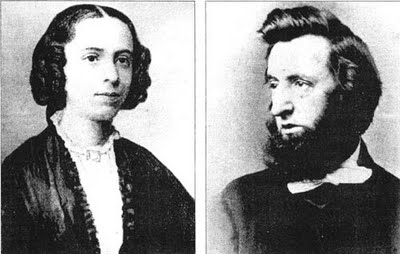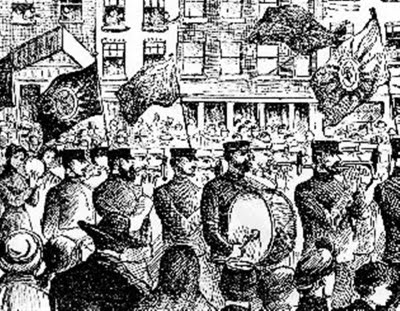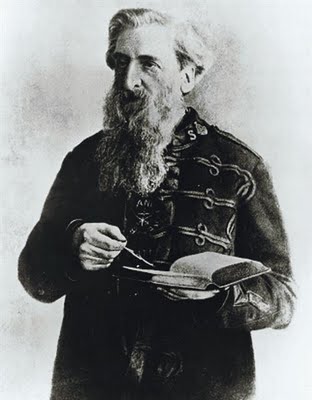Likes, Don’t Likes, And Divine Guidance
Each morning the barkeep came outside the bar, attached a garden hose to an outside spigot, and hosed blood, spilled the night before in drunken fights, off the sidewalk.
The notorious bar sat at the corner of Eight and Main in Jacksonville’s Springfield section, an area since subjected to urban renewal, still a tough area but back then a squalid slum.
I drove by that corner every night going home from work.
A few years ago as I drove by one evening, I heard music, not honky-tonk music but a gospel tune. Glancing over, I saw a small group of clean-cut young people conducting an evangelistic meeting before a gathered crowd of bums. Interested, I pulled over, parked, and walked back to stand at the fringe of the watchers. Hot, sweaty and filthy from my day’s work, I blended right in with the other bums.
The guys in the church group looked like wimps to me—brave wimps to be out there at all, but wimps nonetheless. The group included a few girls, one especially noticeable because the way she enthusiastically kept time to the music with her tambourine.
A crusty street guy nudged me with his elbow. “Just look at that gal shake that thing”.
He was not referring to her tambourine.
“What do you suppose would happen,” he said, “If I was to run up there and grab her tits”?
I thought it over for a moment then answered in a slow drawl, “Well, I don’t know it for a fact, but I imagine somebody would throw you down on the pavement, kick off your kneecaps, then stomp you till blood squirts out your ass”.
Now he looked me full in the face. “You really think so”.
“I reckon”.
“Ain’t Christians supposed to love people”?
“Yeap”.
“Are you with those kids”?
“Nope. Just watching the show, same as you,” I said.
“Oh,” he said and edged away into the crowd.
After those pathetically young Christians finished their service uninterrupted, I got back in my car without having spoken to anyone else and drove on home.
I wouldn’t swear to it, but I suspect I did the will of God that day.
I had not thought of this non-incident for years till a conversation with my friend Wes yesterday reminded me of it.
Wes took me out to breakfast and when we returned to my house we enjoyed a long conversation about Christian mysticism, pietism, subjective religion, objective reality, and logic. Our talk centered around the question: Just Who’s In Charge Here Anyhow?
My talk with Wes Tuesday and my talk with Barbara Monday boosted my spirits to resume work on that will of God manuscript again.
By pondering the question of control, divine guidance, and God’s will for individuals, and by reading a biography this afternoon, I see four elements related to how the Lord guides us.
Sometimes God guides us by using things we like.
Sometimes God guides us through things we don’t like.
Sometimes He guides us through things other people don’t like.
And sometimes He guides us by using things other people do like.
I spotted these four elements at work in the lives of William and Catherine Booth, founders of the Salvation Army.
For instance, on April 10, 1852, William and Catherine met for the first time at the home of a mutual friend.
He liked what he saw.
She liked what she saw.

He walked her home afterwards.
As she later described it, “It seemed as if God flashed simultaneously into our hearts that affection which none of the changing vicissitudes with which our lives have been so crowded has been able to efface… Before we reached my home we both felt as though we had been made for each other”.
They married within three years. They remained together till her cancer death 38 years later.
I think they had received God’s guidance through something they liked.
On the other hand, William hated his job. When he was 13, his father had died and William became sole support of his mother and family. He had to take work as a pawnbroker’s assistant. Seeing destitute wretches pawn the very clothes off their backs just to buy bread, a night’s lodging, or another cup of gin, turned his stomach.
Yet it was that distasteful daily contact with the poor that developed Booth’s sense of compassion and influenced the future course of his life—and of England.
Walking home from a Methodist meeting one night, Booth said he was filled with a sudden spiritual exaltation, a sense of being forgiven by the blood of Christ, and a sense of gratitude to God. He knew this ought to be expressed by preaching the Gospel to the poor. He and Catherine decided to “reach for the worst”.
God was leading him by way of a job he did not like and found galling.
So, William Booth gathered a bunch of street people together and took them into his church. The church folk did not like these nasty sinners cluttering up the sanctuary. Booth and company were kicked out.
God guided Booth by way of something other people did not like.
Trusting God to provide and having no study income, William and Catherine began to preach on the streets, in front of bars and dance halls, at public hangings, anywhere lost, lonely, hurt people might be found. Their motto became “to work where the need is greatest, guided by faith in God and love for all people”.
The Booths had found their niche.
By 1879, they had established 81 preaching stations throughout London, recruited helpers, and held 140 services every week. They established soup kitchens, employment services, reading rooms, street schools, immigration helps, health care services, and a host of other needed helps for the poor… A book they and their son wrote, In Darkest England, changed the face of the British government’s social attitude to this day.
All rooted in the fact that some other people kicked them out of a church because the refined congregation did not like what they were doing. That’s the way it appears on the surface, but underneath are the Everlasting Arms.
What about something other people did like?
Once at one of Booth’s open air evangelistic meetings in Salisbury, a local builder named Charles Fry and his three sons became interested. The four happened to enjoy playing in a local brass band. Just because they liked to play, they brought their instruments to the meeting and began to play peppy tunes.
When someone objected that the tunes fit a barroom venue better than a religious meeting, Booth countered, “Why should the devil have all the good tunes?”.
Thus came into being the world-famous Salvation Army bands, rooted in God’s guidance through a bunch of guys who liked to toot their horns.

Taking inspiration from an organized military model, Booth fought the works of the devil .Near the end of his life as a guest of royalty, General Booth was invited to deliver an address in London’s prestigious Albert Hall. He said,
“While women weep as they do now, I’ll fight; while little children go hungry as they do now, I’ll fight; while men go to prison as they do now, in and out, in and out, I’ll fight; while there remains one dark soul without the light of God, I’ll fight—I’ll fight to the very end”.

Please, visit my website for more www.cowart.info and feel free to look over and buy one of my books www.bluefishbooks.info
posted by John Cowart @ 4:26 AM


2 Comments:
PS: I didn't make the connection clear, but the church youth group I saw holding the street meeting at 8th & Main were not Salvation Army. No uniforms. I have no idea which church they were from, just kids telling folks about Jesus.
--John
Dear John
The Romans 10:"Everyone who calls on the name of the Lord will be saved."[f]
14How, then, can they call on the one they have not believed in? And how can they believe in the one of whom they have not heard? And how can they hear without someone preaching to them?"
It is such an important thing, the gospel must be spread, by the Salvation Army, nice young people or by gifted John Cowart.
Either in speaking or in writing.
People simply cannot believe what they have not heard.
You have chosen the good way. Stay on to it.
Another favorite of mine.
Ecclesiastes 11
Bread Upon the Waters
1 Cast your bread upon the waters,
for after many days you will find it again.
2 Give portions to seven, yes to eight,
for you do not know what disaster may come upon the land.
God bless you, author and preacher.
From Felisol
Post a Comment
<< Home